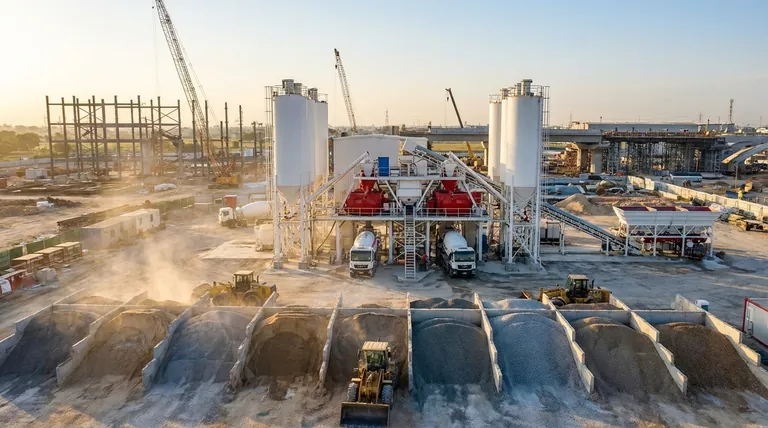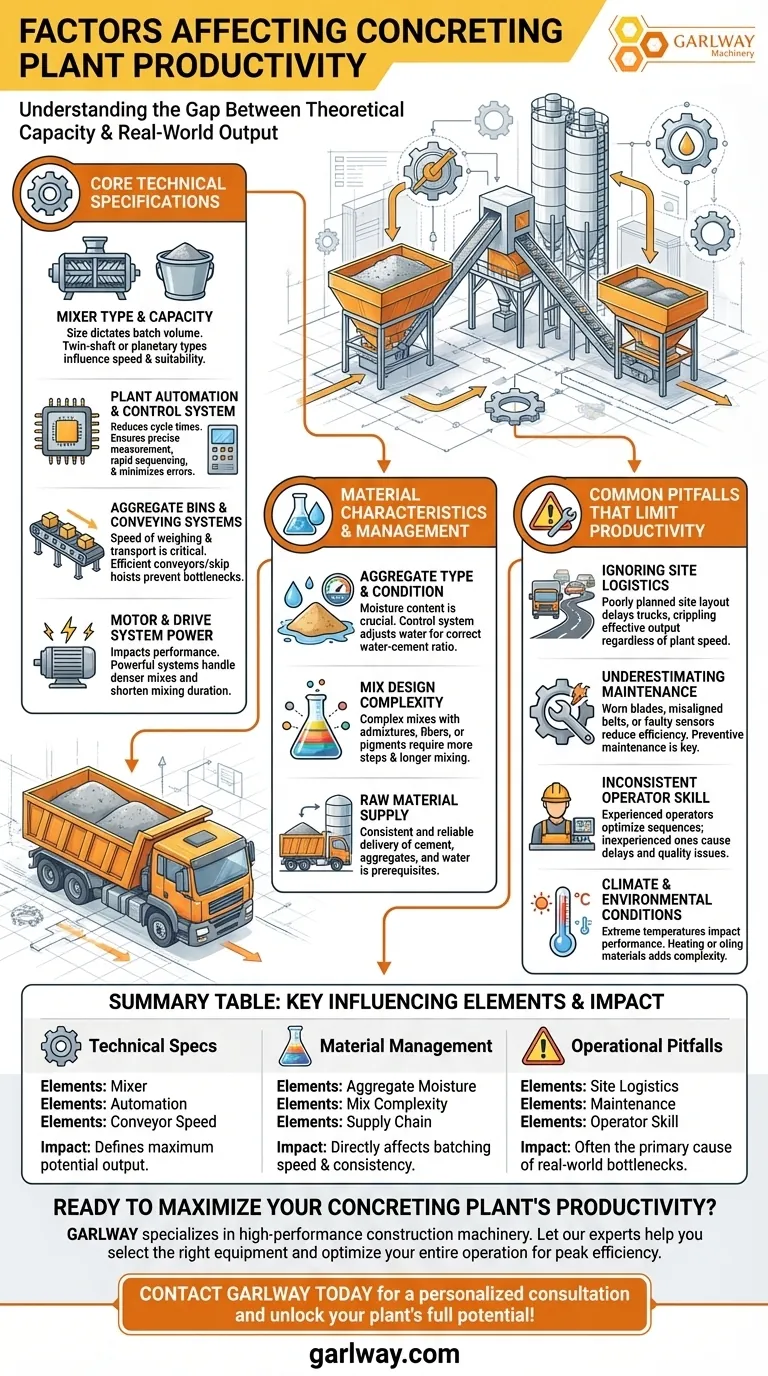To understand the productivity of a concreting plant, you must look beyond its stated capacity. The true output is governed by a combination of the plant's technical specifications, the properties of the raw materials being used, and the operational and environmental conditions on site. These factors work together, and a bottleneck in any single area can significantly reduce the entire operation's efficiency.
A concrete plant's theoretical capacity is a starting point, but its actual, real-world productivity is a direct result of how well its mechanical design, material supply chain, and operational logistics are synchronized.

Core Technical Specifications
The design and engineering of the plant itself form the foundation of its potential output. The manufacturer's specifications define the upper limit of productivity under ideal conditions.
Mixer Type and Capacity
The mixer is the heart of the plant. Its size dictates the volume of concrete per batch, and its type (e.g., twin-shaft or planetary) influences the mixing speed and suitability for different mix designs.
Plant Automation and Control System
Modern automated systems drastically reduce batch cycle times. A sophisticated control system ensures precise measurement and rapid sequencing of materials, minimizing human error and delays between batches.
Aggregate Bins and Conveying Systems
The speed at which aggregates can be weighed and transported to the mixer is a common bottleneck. The efficiency of conveyor belts or skip hoists is critical to maintaining a high production rate.
Motor and Drive System Power
The power of the motors driving the mixer and conveyors directly impacts performance. More powerful systems can handle denser, more complex mixes and shorten the mixing duration without strain.
Material Characteristics and Management
The raw materials are not passive ingredients; their properties and handling directly influence the speed and consistency of the production process.
Aggregate Type and Condition
The moisture content of sand and aggregates is a crucial variable. The control system must constantly adjust the added water to maintain the correct water-cement ratio, which can add time to the batching cycle.
Mix Design Complexity
A simple mix with few components can be batched quickly. Conversely, a complex, high-performance mix with multiple admixtures, fibers, or pigments requires more steps and longer, more thorough mixing, reducing the number of batches per hour.
Raw Material Supply
A plant's productivity is zero if it's waiting for materials. Consistent and reliable delivery of cement, aggregates, and water is an absolute prerequisite for achieving target output.
Common Pitfalls That Limit Productivity
Even the most advanced plant can underperform if operational factors are ignored. These practical constraints often have the largest impact on day-to-day output.
Ignoring Site Logistics
The most common bottleneck is often outside the plant itself. A poorly planned site layout that creates delays for mixer trucks arriving and departing will cripple the plant's effective output, no matter how fast it can produce a batch.
Underestimating Maintenance
Worn mixer blades, misaligned conveyor belts, or faulty sensors directly reduce efficiency. A proactive preventive maintenance schedule is essential to prevent slowdowns and ensure consistent performance.
Inconsistent Operator Skill
A well-trained operator can optimize batching sequences and quickly troubleshoot minor issues. An inexperienced operator, on the other hand, can be a significant source of delays and inconsistent product quality.
Climate and Environmental Conditions
Extreme temperatures impact concrete performance and production. In cold climates, aggregates may be frozen, and water may need heating. In hot climates, chilled water or ice may be required, adding complexity and time to the batching process.
Making the Right Choice for Your Goal
To improve productivity, you must first identify your primary objective and analyze the system as a whole, not just the machinery.
- If your primary focus is maximizing daily output for a large project: Prioritize a plant with a large twin-shaft mixer, a fully automated control system, and a meticulously planned site for truck logistics.
- If your primary focus is producing diverse, high-specification mixes: Invest in a plant with a precise control system and versatile dosing equipment for multiple admixtures, even if the raw batch speed is slightly lower.
- If your primary focus is optimizing an existing plant: Conduct a bottleneck analysis, starting with truck cycle times and raw material loading, as these external factors are often the easiest to improve.
Ultimately, achieving maximum productivity requires treating the concrete plant not as a single machine, but as the center of a complex, interconnected system.
Summary Table:
| Factor Category | Key Influencing Elements | Impact on Productivity |
|---|---|---|
| Technical Specs | Mixer type & capacity, Automation level, Conveyor speed | Defines the plant's maximum potential output |
| Material Management | Aggregate moisture, Mix complexity, Supply chain reliability | Directly affects batching speed and consistency |
| Operational Pitfalls | Site logistics, Maintenance schedule, Operator skill | Often the primary cause of real-world bottlenecks |
Ready to maximize your concreting plant's productivity?
GARLWAY specializes in high-performance construction machinery, including robust concrete batching plants, mixers, and winches designed for construction companies and contractors globally. Our experts can help you select the right equipment and optimize your entire operation for peak efficiency.
Contact GARLWAY today for a personalized consultation and unlock your plant's full potential!
Visual Guide

Related Products
- HZS120 Ready Mix Concrete Batching Plant Commercial Mud Cement Mixer
- HZS180 Ready Mix Concrete Plant for Foundations with Sand and Cement
- HZS75 Concrete Batching Plant Cement Mixer Price Concrete Mixer Bunnings Mixing Plant
- HZS35 Small Cement Concrete Mixing Batch Plant
- JW1000 Mobile Cement Mixer Concrete Mixer Truck and Batching Plant
People Also Ask
- How to start a concrete plant business? A Step-by-Step Guide to Launching Your Venture
- How to make ready mix concrete stronger? Boost Strength with Proven Mixing Techniques
- What are the disadvantages of ready mix concrete? Navigating Logistical and Cost Challenges
- How much to start a cement plant? A Deep Dive into Costs and Strategy
- How does a ready-mix concrete plant work? A Guide to Efficient, High-Quality Production

















